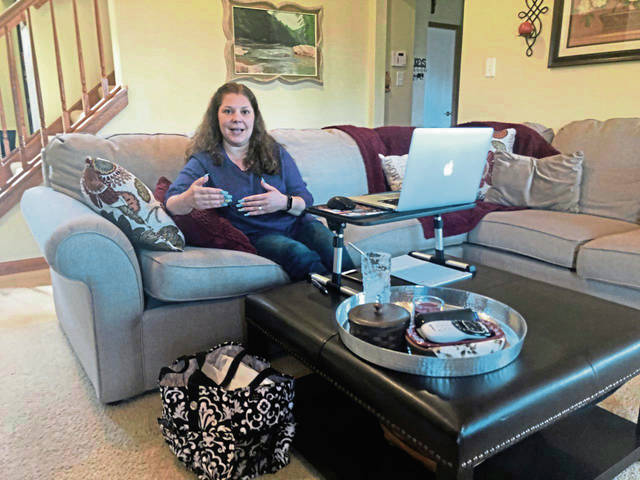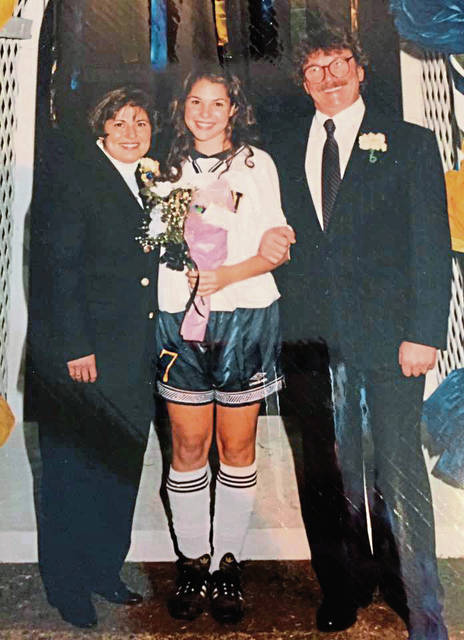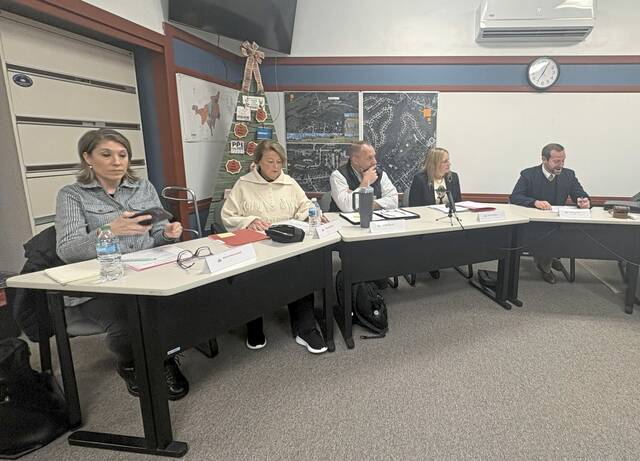A North Huntingdon mother of four is among about 2 million Americans part of a group — “Millions Missing” — that no one wants to join because it means having chronic fatigue syndrome and multiple complications she has had to deal with for about 25 years.
“When I walk, my heart feels stressed,” even if it is just walking around the house, said Melissa L. Karabin, 42, who has been diagnosed with myalgic encephalomyelitis/chronic fatigue syndrome, a multisystem disease for which there is no cure and treatments may or may not work to make life easier.
The once-active Norwin High School graduate finds herself as one of an estimated 836,000 to 2½ million Americans suffering from ME/CFS, according to the U.S. Centers for Disease Control and Prevention.
To raise awareness about a disease little know about, the nonprofit advocacy group #MEAction USA has joined international organizations in designating May 12 as a day for raising awareness for chronic immunological and neurological diseases. Those chronic diseases include ME/CFS, fibromyalgia, Gulf War syndrome and multiple chemical sensitivity. May 12 was selected because it is the birthday of Florence Nightingale, the founder of modern nursing who is believed to have suffered from ME/CFS.
The Millions Missing is an appropriate tag for what the disease has done to Karabin, who has struggled to interact with friends and family because of her physical and emotional symptoms. She has missed many holidays with her husband, Matt, and children Jacob, 21; Ben, 19; Samantha, 15; and Joseph, 13, because she has been too ill to get out of bed. There have been times after exerting herself when she stays in bed for days at a time.
“Who wants to stay in bed for days (because of fatigue) when you are 42?” Karabin said.
Before becoming ill, Karabin, the daughter of Charles and Marcia Matthias, was active as a youngster in North Huntingdon, performing in dance and playing soccer.
As a Norwin High School senior in fall 1995, she contracted mononucleosis due to the Epstein-Barr virus. The enduring mononucleosis-like symptoms have lingered and worsened. She became ill while studying engineering at Penn State and experienced worsening cold and allergy symptoms, a sore throat and fatigue. While working as a mechanical engineer in 2003, she was completely exhausted again and took medication for allergies. She then had her third case of mononucleosis.
Karabin suffered severe stomach pain that persisted after her third child was born in 2005. Her fourth child, a son, was born in 2008. She worked part time while dealing with other chronic health issues over the next several years, including irritable bowel syndrome, insomnia and pain.
Karabin said her physical and mental health continued to deteriorate since the over-prescribing of antibiotics and steroids after surgery for a deviated septum. She developed severe gastrointestinal symptoms and is unable to take antibiotics and steroids due to the damage to her digestive tract.
She was diagnosed with fibromyalgia in 2019, which was consistent with her symptoms of pain and stiffness, fatigue, tiredness, depression and anxiety. But it was not until she found a ME/CFS specialist in New York City that she was correctly diagnosed in March. She has been treated for her symptoms by physicians in Western Pennsylvania, but they were unable to diagnose her properly, Karabin said.
It is not unusual for the disease to go undiagnosed. The CDC says the illness is often misunderstood and might not be taken seriously by some health care providers. Researchers have not yet found what causes ME/CFS, and there are no specific laboratory tests to diagnose ME/CFS directly.
Subsequent cardiology tests showed that Karabin had a heart of an 80-year-old woman — close to double her age. It means she can experience a shortness of breath — a classic symptom of heart disease — by simply walking or doing household chores.
In January 2020, due to severe stomach pain, distress and nerve pain, she would finish working, then go to sleep. Her husband would wake her for dinner, and then she would go back to sleep afterwards.
Riding in a car to see her sons at Penn State’s Behrend campus in Erie meant lying down in the car and resting. Eating out and shopping was exhausting.
Karabin said her cognitive issues worsened five years ago. She has trouble with word-finding and remembering information, including her own medical history.
That has caused her to “not trust herself anymore” due to her cognitive problems. She does not trust herself to drive due to her slowed reaction time, noting that two years ago she fell asleep three times while driving her family home from a trip.
The failure of the government to devote sufficient money to conduct research into ME/CFS is a constant source of frustration, said Adriane Tillman, a spokeswoman for #MEAction, a California-based advocacy group for ME/CFS.
Tillman said they are hoping the National Institutes of Health will launch research into the symptoms suffered by “long-haulers” — those covid victims suffering from malaise after exerting themselves, fatigue and cognitive dysfunction — which are at the core of the symptoms of the ME/CFS victims.
“We are seeing it (ME/CFS) happen right before our eyes on a massive scale,” said Tillman, who suffers from ME/CFS.
Karabin hopes that research can help her in her battle against the disease.
“By eating right, taking care of myself and resting, maybe in 10 to 20 years from now,” she said she can regain enough energy to be at least at 50% of where she was before the disease altered her life.













